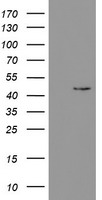PHKG2 Mouse Monoclonal Antibody [Clone ID: OTI1F9]
CAT#: TA800355
PHKG2 mouse monoclonal antibody, clone OTI1F9 (formerly 1F9)
Size: 30 ul
Formulation: Carrier-Free
USD 436.00
USD 200.00
Specifications
| Product Data | |
| Clone Name | OTI1F9 |
| Applications | IHC, WB |
| Recommended Dilution | WB 1:1000, IHC 1:150 |
| Reactivities | Human, Mouse |
| Host | Mouse |
| Isotype | IgG2b |
| Clonality | Monoclonal |
| Immunogen | Human recombinant protein fragment corresponding to amino acids 1-216 of human PHKG2 (NP_000285) produced in E.coli. |
| Formulation | PBS (pH 7.3) containing 1% BSA, 50% glycerol and 0.02% sodium azide. |
| Concentration | 1 mg/ml |
| Purification | Purified from mouse ascites fluids or tissue culture supernatant by affinity chromatography (protein A/G) |
| Conjugation | Unconjugated |
| Storage | Store at -20°C as received. |
| Stability | Stable for 12 months from date of receipt. |
| Predicted Protein Size | 46.3 kDa |
| Gene Name | phosphorylase kinase catalytic subunit gamma 2 |
| Database Link | |
| Background | Phosphorylase kinase is a polymer of 16 subunits, four each of alpha, beta, gamma and delta. The alpha subunit includes the skeletal muscle and hepatic isoforms, encoded by two different genes. The beta subunit is the same in both the muscle and hepatic isoforms, and encoded by one gene. The gamma subunit also includes the skeletal muscle and hepatic isoforms, and the hepatic isoform is encoded by this gene. The delta subunit is a calmodulin and can be encoded by three different genes. The gamma subunits contain the active site of the enzyme, whereas the alpha and beta subunits have regulatory functions controlled by phosphorylation. The delta subunit mediates the dependence of the enzyme on calcium concentration. Mutations in this gene cause glycogen storage disease type 9C, also known as autosomal liver glycogenosis. Alternatively spliced transcript variants encoding different isoforms have been identified in this gene. |
| Synonyms | GSD9C |
| Reference Data | |
| Protein Families | Druggable Genome, Protein Kinase |
| Protein Pathways | Calcium signaling pathway, Insulin signaling pathway |
Documents
| Product Manuals |
| FAQs |
| SDS |
Resources
| Antibody Resources |
Other Versions
| SKU | Description | Size | Price |
|---|---|---|---|
| CF800355 | Carrier-free (BSA/glycerol-free) PHKG2 mouse monoclonal antibody, clone OTI1F9 (formerly 1F9) |
USD 600.00 |
|
| TA800355AM | PHKG2 mouse monoclonal antibody,clone 1F9, Biotinylated |
USD 509.00 |
|
| TA800355BM | PHKG2 mouse monoclonal antibody,clone 1F9, HRP conjugated |
USD 509.00 |
|
| TA800355S | PHKG2 mouse monoclonal antibody, clone OTI1F9 (formerly 1F9) |
USD 200.00 |
{0} Product Review(s)
Be the first one to submit a review






























































































































































































































































 Germany
Germany
 Japan
Japan
 United Kingdom
United Kingdom
 China
China









